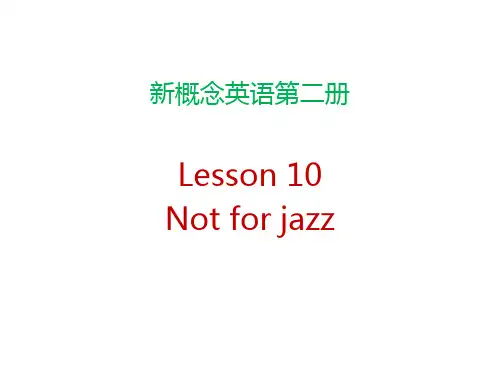新概念2册第10课课件PPT课件
- 格式:ppt
- 大小:7.45 MB
- 文档页数:18
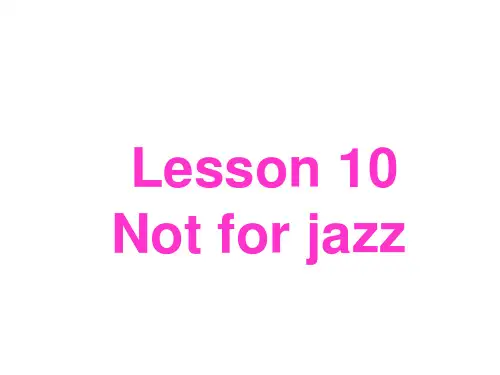
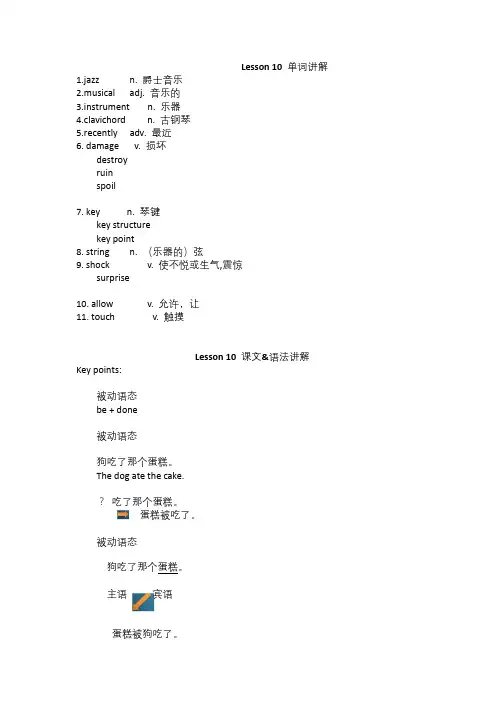
Lesson10单词讲解1.jazz n.爵士音乐2.musical adj.音乐的3.instrument n.乐器4.clavichord n.古钢琴5.recently adv.最近6.damage v.损坏destroyruinspoil7.key n.琴键key structurekey point8.string n.(乐器的)弦9.shock v.使不悦或生气,震惊surprise10.allow v.允许,让11.touch v.触摸Lesson10课文&语法讲解Key points:被动语态be+done被动语态狗吃了那个蛋糕。
The dog ate the cake.?吃了那个蛋糕。
蛋糕被吃了。
被动语态狗吃了那个蛋糕。
主语宾语蛋糕被狗吃了。
被动语态be+done教室每天都打扫。
Classrooms____________(clean)every day.被动语态be+done被动语态be+done教室每天都打扫。
Classrooms are cleaned(clean)every day.被动语态be+done一座新的大楼去年建造的。
A new building was built(build)last year.被动语态be+done他每天被打。
他昨天被打了。
他明天将要被打。
他现在正在被打。
被动语态be+done 他每天被打。
He is beaten every day.他昨天被打了。
He was beatenyesterday.他明天将要被打。
He will be beatentomorrow.他现在正在被打。
He is being beaten.English is spoken(speak)all over the world. The stadium was built(build)in1998.罗马不是一天建成的。
Rome was not built in a day.人们现在正在被广告所影响。
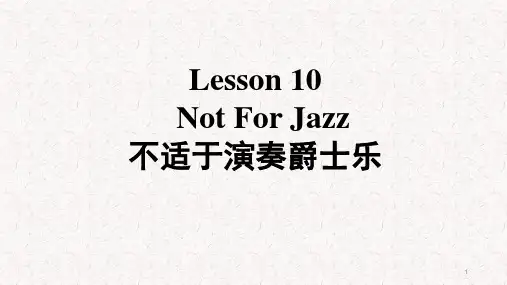
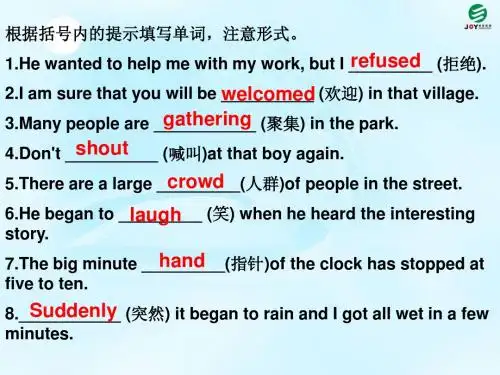
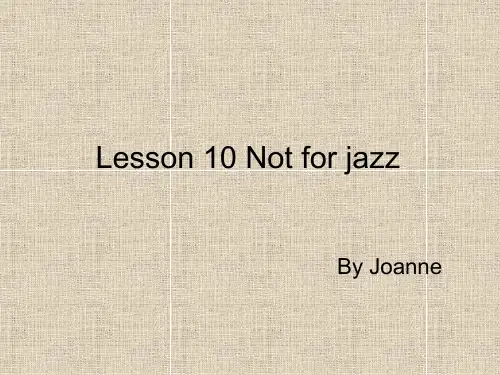
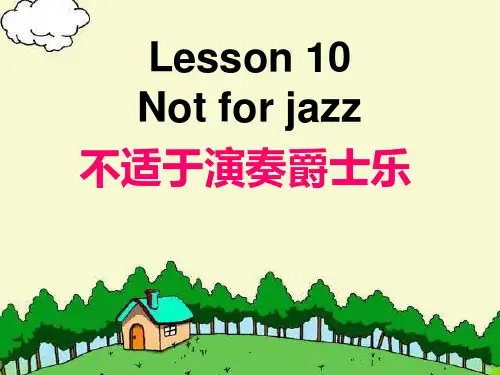
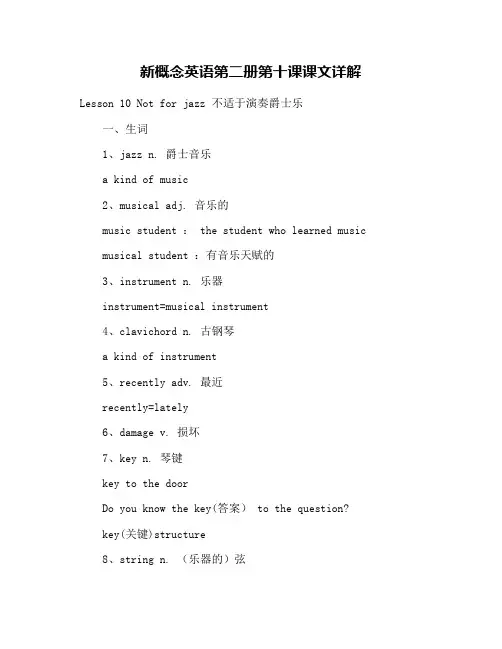
新概念英语第二册第十课课文详解 Lesson 10 Not for jazz 不适于演奏爵士乐一、生词1、jazz n. 爵士音乐a kind of music2、musical adj. 音乐的music student : the student who learned music musical student :有音乐天赋的3、instrument n. 乐器instrument=musical instrument4、clavichord n. 古钢琴a kind of instrument5、recently adv. 最近recently=lately6、damage v. 损坏7、key n. 琴键key to the doorDo you know the key(答案) to the question?key(关键)structure8、string n. (乐器的)弦9、shock v. 使不悦或生气,震惊跟人的情绪相关的动词的宾语往往是"人"The news shocks me凡是能够用"人"做宾语,又是表示人的情绪活动的动词,有两个形容词形成:1.令人……;+ -ing2.感到…… + -edIt shocked me.It is shocking.I'm shocked.get a shock n.sb.get a shocksurprise 好事坏事都能够,只要你没有料到I want to give you surprise.shock 只能是坏事,让人感到不高兴10、allow v. 允许,让allow doingSmoking is allowed.allow sb. to do sthsb.be allowed to do sth.You are allow to smokeYou are not allow to enter the room if you don't take the card with youallow用被动11、touch v. 触摸,碰二、词组:1、Our clavichord is kept in the living-room.在这个句子里,keep作动词,表示保存,存放。

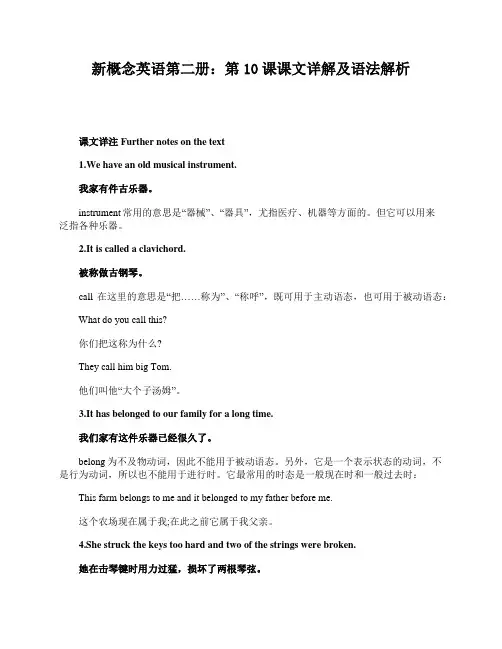
新概念英语第二册:第10课课文详解及语法解析课文详注 Further notes on the text1.We have an old musical instrument.我家有件古乐器。
instrument常用的意思是“器械”、“器具”,尤指医疗、机器等方面的。
但它可以用来泛指各种乐器。
2.It is called a clavichord.被称做古钢琴。
call在这里的意思是“把……称为”、“称呼”,既可用于主动语态,也可用于被动语态:What do you call this?你们把这称为什么?They call him big Tom.他们叫他“大个子汤姆”。
3.It has belonged to our family for a long time.我们家有这件乐器已经很久了。
belong为不及物动词,因此不能用于被动语态。
另外,它是一个表示状态的动词,不是行为动词,所以也不能用于进行时。
它最常用的时态是一般现在时和一般过去时:This farm belongs to me and it belonged to my father before me.这个农场现在属于我;在此之前它属于我父亲。
4.She struck the keys too hard and two of the strings were broken.她在击琴键时用力过猛,损坏了两根琴弦。
并列连词and在这里的意义相当于so,表示后一句是前一句的结果。
再如:He fell heavily and broke his arm.他摔得很重,手臂都摔断了。
语法 Grammar in use1.被动语态(The passive)主动语态与被动语态皆指动词的形式而言。
在主动句中,动词的主语是执行动作的人或物:John cooked the food last night.约翰昨天晚上做了饭。
在被动句中,动作是对主语执行的:The food was cooked last night.饭是昨天晚上做的。
